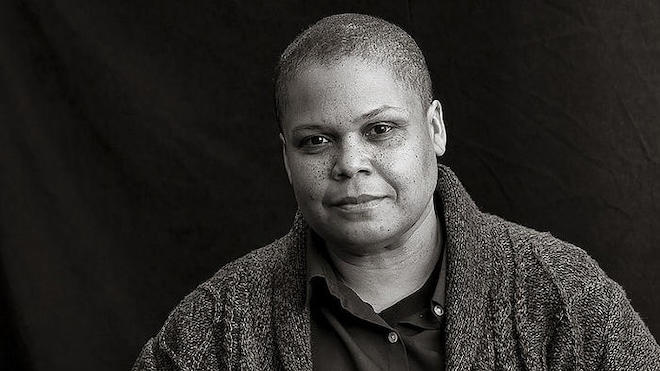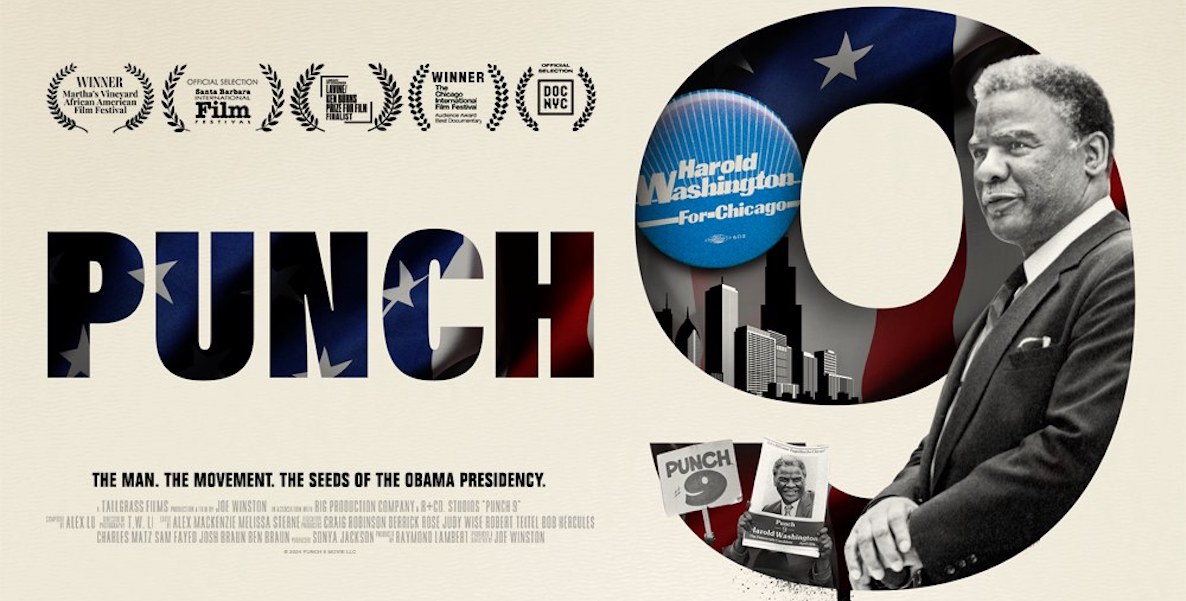“I had just gotten out of college, and Harold Washington had just been elected in 1983,” Barack Obama once recalled. “And I was very much interested in seeing what the possibilities were for progressive politics in the Black community. And Chicago was the most exciting thing going on at the time.”
What was it that drew the young community organizer to the Windy City? A man he’d never met. Harold Washington was the fiery, funny, and charismatic first Black mayor of Chicago, an insurgent who, in 1983, took on a political machine rife with corruption and discrimination, and won. His was an epic story of a people-led movement — Washington’s multiracial coalition registered over 100,000 voters — that still speaks to us today.

Punch 9 For Harold Washington is filmmaker Joe Winston’s account of Washington’s stunning rise and its inevitable backlash. On November 14, to kick off our 7th annual Ideas We Should Steal Festival, Winston will join us for a screening of his groundbreaking film and a live How To Really Run a City podcast discussion about the issues raised in the documentary with hosts former Mayor Michael Nutter and former Atlanta Mayor Kasim Reed, along with New Yorker writer, Princeton professor and MacArthur “Genius” Keeanga-Yamahtta Taylor. (See the rest of our Festival lineup here.)
Washington was an outsider who had come up through the infamous Daley political machine — before brilliantly dismantling it. But it wasn’t easy. Washington — facing not-so-subtle advertising slogans like “Before It’s Too Late” — took on patronage and the old-boys’ backroom establishment, which hit back hard, virtually blocking the new mayor at every turn.
But Punch 9 shows an indefatigable and charismatic spirit. “In the old days,” Washington would say, “when you told people in other countries that you were from Chicago, they would say, ‘Boom-boom! Rat-a-tat-tat!’ Nowadays, they say ‘How’s Harold?’!” It became a refrain: How’s Harold?, and the clarion call of a city at joyous war with its long unjust status quo.
Tragically, Washington died in 1987 of a massive heart attack shortly after winning reelection, having won his first-term war with City Council. Chicago was on the move, and Washington had a growing national reputation. As Punch 9 documents, progressive politics in the city and beyond were long traumatized by his death, but Washington left behind a blueprint for political uprisings and a cautionary tale for the type of backlash prompted by such bold claims to rightful power. Check out the trailer here:
This week, I caught up with veteran filmmaker Joe Winston, who also produced the documentaries What’s the Matter with Kansas? and Citizen Koch. In advance of our screening and conversation with the mayors and Taylor, here’s a preview of the conversation we’ll get into live on November 14:
Larry Platt: Joe, you’ve made a terrific and important film. Why do it?
Joe Winston: I grew up in the same neighborhood of Chicago — Hyde Park— where Harold Washington lived when he was first elected mayor. Harold was a local hero. I was young and not particularly politically astute at age 15, but I understood the raw racism and injustice. I knew what “Before It’s Too Late” meant.
And the thing that really struck me and led me to want to make a film about Harold was the White backlash to the Obama presidency, and in particular how caught off-guard the Obama administration and many liberals were, because I completely expected it. I had seen what happened to Harold Washington. So it seemed to me that the Harold Washington story was much more than a great man story about a particular politician in a particular time and place, but sort of a universal parable, a story we can tell that unlocks some of the mysteries of how race and power intersect in America.
One of the reasons I think the film resonates so much today is it shows the difference a political movement can make.
It’s very important to recognize that Harold Washington didn’t come out of nowhere. You know, he was buoyed by these vibrant social movements for justice and racial equality in Chicago that had been building for decades, and that registered over 100,000 new voters for the 1983 election that brought Mayor Washington into office. You know, Harold brought activists into his administration and they helped set his policies and agenda.
Philly still has the remnants of a long-standing political machine. Talk about Harold’s reforming of the infamous Daley machine. He came up through it, yet took it on, right?
Right. So, he had to get along with these people. He had to find his lane and knew when he could step out of it. He knew how the sausage was made. But after the 1970s, machine politics as had been practiced by the Daleys was simply no longer sustainable.
There was no longer the kind of federal government largesse to allow the hiring of all the nephews and no-show employees and incompetent city government staff. There had been some consent decrees calling for the outlawing of these practices but mayors prior to Washington would not sign them. So, one of the first things he did was he signed these decrees outlawing political patronage.
That could be political suicide. Why wasn’t it?
The kind of coalition building Harold did I think is tremendously inspiring. You know, he didn’t have a simple majority in Chicago of African American voters. He was not going to get elected or be able to govern on the basis of any one voting bloc alone, which is what’s interesting about the racial makeup of Chicago at that time …
Wasn’t it 40 percent Black, 40 percent White, and 20 percent Hispanic?
Basically. And it took tremendous energy and political will and skill to keep that coalition together. For example, he empowered the Hispanic communities, which in Chicago were largely Mexican or Puerto Rican, and gave them a voice in government for the first time. And of course, those communities grew not only during his administration but since, and became much more powerful.
And he had to juggle his sort of traditional base constituency in the African American community with newer constituencies. And he did things that were very risky at the time, like attending a gay pride parade, right at the height of the AIDS crisis.
I’ve heard you describe Harold as a once-in-a-lifetime political talent. What comprises that skillset?
Most people feel he was, I’d say, a once-in-a-generation political talent. Certainly David Axelrod, who advised Washington and would go on to advise Obama, thinks so ..
He’s in the film, very youthful looking …
That’s right. You know, Harold was a synthesis of old-school retail politicking, and the civil rights movement. He had the loftiest of ideals — the Martin Luther King idea of unifying society into something that was just for everyone — combined with the savvy and bluntness of the retail politician who’s going to bring you a pot of chicken, you know?
In the film, Harold goes to war with the machine. We’ve had reform movements in Philly, but they’ve been gentler, more compromising.
Yes, the Harold Washington story also raises the question of how far do you go in efforts at reform? At the time, he was thought to be foolish to take the machine on so directly and to just fight this war. He totally could have compromised. He wanted to have the fight then and there, to the death. And I believe that’s what killed him. Many people who mourn Harold in Chicago believe that he was somehow poisoned or murdered. Particularly in the Black community. But his close friends and allies who were in the film agreed with me. The job killed him.
Join us on the evening of November 14 to hear more from Winston, the mayors and Keeanga-Yahmatta Taylor on the future of the type of multiracial politics Washington gave his life for, a mere 10 days after an election where such dreams of pluralism just might be on the ballot.
![]() MORE IDEAS WE SHOULD STEAL 2024
MORE IDEAS WE SHOULD STEAL 2024



